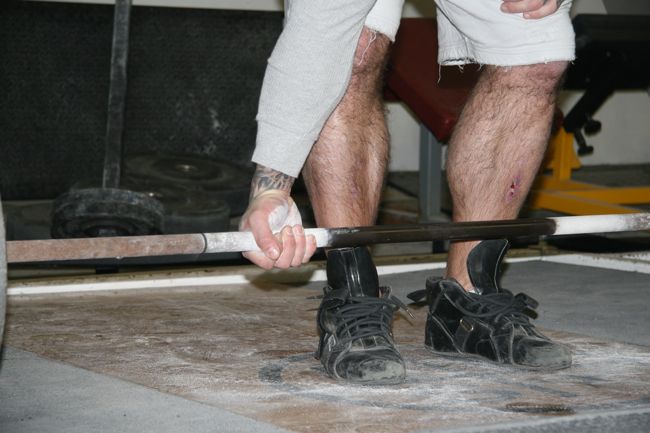
What is this sport I love so much? It’s a circle of obsession, frustration, success, and injury. That is what weightlifting is to me. What is it to you?
You might be wondering just what the hell the title means. As a strength coach, I sometimes find it hard to separate my own training in weightlifting from that of my athletes. I want to train them the way I train myself—as a weightlifter. I want them to perform the movements I do and succeed in what they pursue. At the same time, I want to keep them as close as possible to remaining free of injury. However, this would only be appropriate if I exclusively trained weightlifters. As much as I’d like to do that full-time, I know an opportunity like that is few and far between. I have to expand to other athletes to fill the void between the few weightlifters (and myself) I train.
Weightlifters are one of the only groups of athletes who have to lift not only to gain strength and power for their sport but also to practice their sport. I'm constantly scrutinized by others for the way I train, not because I have poor training methods but because many are unfamiliar with the sport. Many don't see the benefit of increasing the frequency of certain muscle groups (e.g. leg musculature) to increase strength. They are stuck in the old-school, bodybuilding mentality of hitting everything once per week. They also don't understand that the technique required to perfect each movement takes thousands upon thousands of repetitions. It isn’t enough to come into the gym, do a few sets, and leave. It takes practice with an empty bar, which even I didn't do for the first couple years that I competed.
As I continue to learn from multiple coaches, I begin to realize how much time I wasted in the very short time I've been competing in this amazing sport. I was beyond ignorant in the way I trained for the first couple years of my competitive career. I won’t go into any detail, but contact me if you want to see some ridiculous methods. Of course, without a steady coach, who can blame me? This sport definitely has a steep learning curve in almost every way imaginable, from the technique to the strength methods involved and from the volume of training to the time management required to balance training (real life) with the rest of one's daily duties (filler time between sessions).
Although there are many similarities between training athletes from other sports and the Olympic lifts, there are many differences as well. With other sports,  there isn't as much focus on technique as there is in the sport of weightlifting. Speed and agility work as well as conditioning are much more of a consideration for other sports than they are for weightlifting. Personally, I don't know many weightlifters who include any of these components in their programs. It isn't that these components aren't important. They just aren't as important in the sport of weightlifting as they are in other sports. If you aren't familiar with weightlifting, you have to understand that the legs are being pounded almost every day of the week, and in many cases, multiple times a day. To add conditioning or speed work of some sort is just insane! Admittedly, I know this from experience. Now that you experienced lifters are finished laughing, I’ll have you know that it wasn't any time in the recent past when I was that naive to think I could do something so foolish.
there isn't as much focus on technique as there is in the sport of weightlifting. Speed and agility work as well as conditioning are much more of a consideration for other sports than they are for weightlifting. Personally, I don't know many weightlifters who include any of these components in their programs. It isn't that these components aren't important. They just aren't as important in the sport of weightlifting as they are in other sports. If you aren't familiar with weightlifting, you have to understand that the legs are being pounded almost every day of the week, and in many cases, multiple times a day. To add conditioning or speed work of some sort is just insane! Admittedly, I know this from experience. Now that you experienced lifters are finished laughing, I’ll have you know that it wasn't any time in the recent past when I was that naive to think I could do something so foolish.
Excuse me for the rambling…back on task! The similarities in training between other sports and weightlifting are numerous. Squatting, deadlifting, pressing—ringing any bells? These are some of the main movements used for other sports. Now, look at weightlifting and you'll see that the main strength exercises are very similar—squats, clean or snatch pulls (similar to deadlifts but with lower intensity and higher movement velocity), and presses (some coaches believe pressing is bad for the jerk, so they don’t do it). As you can see, there are many similarities in movements. What about volume? Intensity? I could write for days on this, but I choose not to for obvious reasons. The intensity will generally be higher for weightlifters than for other athletes while the volume will generally be lower. With most things, I can only speak in generalities because each club and lifter trains a little differently than the next.
This a sport I will continue to take part in long after I have to give up competing. It is a sport that helps build athletes in other sports as well. The best sport ever? I think, yes. What do you think?








